|
|
|
Sort Order |
|
|
|
Items / Page
|
|
|
|
|
|
|
| Srl | Item |
| 1 |
ID:
121825
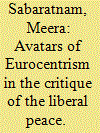

|
|
|
|
|
| Publication |
2013.
|
| Summary/Abstract |
Recent scholarly critiques of the so-called liberal peace raise important political and ethical challenges to practices of postwar intervention in the global South. However, their conceptual and analytic approaches have tended to reproduce rather than challenge the intellectual Eurocentrism underpinning the liberal peace. Eurocentric features of the critiques include the methodological bypassing of target subjects in research, the analytic bypassing of subjects through frameworks of governmentality, the assumed ontological split between the 'liberal' and the 'local', and a nostalgia for the liberal subject and the liberal social contract as alternative bases for politics. These collectively produce a 'paradox of liberalism' that sees the liberal peace as oppressive but also the only true source of emancipation. However, the article suggests that a repoliticization of colonial difference offers an alternative 'decolonizing' approach to critical analysis through repositioning the analytic gaze. Three alternative research strategies for critical analysis are briefly developed.
|
|
|
|
|
|
|
|
|
|
|
|
|
|
|
|
| 2 |
ID:
189094
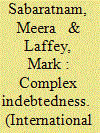

|
|
|
|
|
| Summary/Abstract |
A prominent feature of the contemporary crisis of the liberal international order is diverse calls for justice, including epistemic and historic justice. For a long time, that order understood itself in liberal terms and as capable of delivering justice accordingly. Asking a second-order question, about how questions of justice are framed in the international order, leads us to the conclusion that the liberal order's account of the connections that make the system hang together is partial, if not deeply flawed. Building on long-established and more recent traditions of scholarship aligned with the global South, we introduce a different account of international order and its core dynamics: complex indebtedness. Such an account enables not only a better appreciation of the justice claims currently being made in and against the liberal international order, it also more plausibly explains their origins, interconnections, and multiscalar and polymorphic character. By facing squarely the political parameters of indebtedness, we can make better sense of how to approach claims for justice in the present and future. The argument is illustrated with the examples of struggles for racial justice, white nationalism and South–South co-operation.
|
|
|
|
|
|
|
|
|
|
|
|
|
|
|
|
| 3 |
ID:
150528
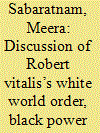

|
|
|
|
|
| Summary/Abstract |
In White World Order, Black Power Politics: The Birth of American International Relations, Robert Vitalis presents a critical disciplinary history of the field of international relations, and the discipline of political science more broadly. Vitalis argues that the interconnections between imperialism and racism were “constitutive” of international relations scholarship in the U.S. since the turn of the 20th century, and that the perspectives of a generation of African-American scholars that included W. E. B. Dubois, Alain Locke, and Ralph Bunche were equally constitutive of this scholarship—by virtue of the way the emerging discipline sought to marginalize these scholars. In developing this argument, Vitalis raises questions about the construction of knowledge and the racial foundations of American political development. These issues lie at the heart of U.S. political science, and so we have invited a range of political scientists to comment on the book and its implications for our discipline.
|
|
|
|
|
|
|
|
|
|
|
|
|
|
|
|
| 4 |
ID:
105934
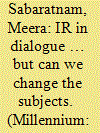

|
|
|
|
|
| Publication |
2011.
|
| Summary/Abstract |
In an effort to reconceive the conduct of 'dialogue' within world politics, it is necessary for us to find new subject-positions from which to speak. This article develops a typology of six distinctive intellectual strategies through which 'decolonising' approaches to social theory can help rethink world politics by bringing alternative 'subjects' of inquiry into being. These strategies include pointing out discursive Orientalisms, deconstructing historical myths of European development, challenging Eurocentric historiographies, rearticulating subaltern subjectivities, diversifying political subjecthoods and re-imagining the social-psychological subject of world politics. The value of articulating the project in this way is illustrated in relation to a specific research project on the politics of the liberal peace in Mozambique. The article discusses a number of tensions arising from engaging with plurality and difference as a basis for conducting social inquiry, as well as some structural problems in the profession that inhibit carrying out this kind of research.
|
|
|
|
|
|
|
|
|
|
|
|
|
|
|
|
| 5 |
ID:
176018
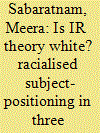

|
|
|
|
|
| Summary/Abstract |
Racism is a historically specific structure of modern global power which generates hierarchies of the human and affirms White supremacy. This has far-reaching material and epistemological consequences in the present, one of which is the production and naturalisation of White-racialised subject positions in academic discourse. This article develops a framework for analysing Whiteness through subject-positioning, synthesising insights from critical race scholarship that seek to dismantle its epistemological tendencies. This framework identifies White subject-positioning as patterned by interlocking epistemologies of immanence, ignorance, and innocence. The article then interrogates how these epistemological tendencies produce limitations and contradictions in international theory through an analysis of three seminal and canonical texts: Kenneth Waltz’s Theory of International Politics (1979), Robert Keohane’s After Hegemony (1984) and Alexander Wendt’s Social Theory of International Politics (1999). It shows that these epistemologies produce contradictions and weaknesses within the texts by systematically severing the analysis of the international system and the ‘West’ from its actual imperial conditions of possibility. The article outlines pathways for overcoming these limitations and suggests that continued inattention to the epistemological consequences of race for International Relations (IR) theory is intellectually unsustainable.
|
|
|
|
|
|
|
|
|
|
|
|
|
|
|
|
|
|
|
|
|